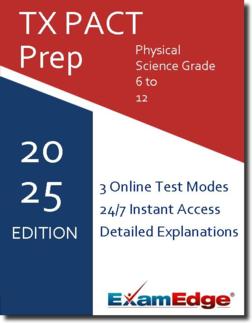TX PACT Physical Science Grade 6 to 12 (737) Practice Tests & Test Prep by Exam Edge - Additional Information
Based on 28 Reviews
- Real Exam Simulation: Timed questions and matching content build comfort for your TX PACT Physical Science Grade 6 to 12 test day.
- Instant, 24/7 Access: Web-based TX PACT Physical Science Grade 6 to 12 practice exams with no software needed.
- Clear Explanations: Step-by-step answers and explanations for your TX PACT exam to strengthen understanding.
- Boosted Confidence: Reduces anxiety and improves test-taking skills to ace your TX PACT Physical Science Grade 6 to 12 (737).



